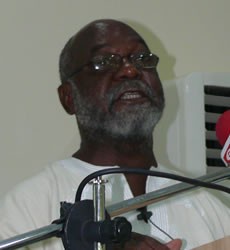
Professor Kwame Karikari, the co-chair of Coalition on the Right to Information- Ghana, has stated that the final draft of Right to Information (RTI) bill was not good enough to stand the test of time.
He said the bill, which is presently before Parliament, must be revised before it is passed into law.
Prof. Karikari said this yesterday in Accra at a day’s capacity building workshop on access to information, organised by the coalition under the auspices of Commonwealth Human Rights International (CHRI).
The workshop brought together public officials mandated to manage records and Information in selected public offices, to promote access to information through effective record management.
The Coalition, which is an umbrella group of civil society organisations advocating the passage of an effective RTI legislation, organised the workshop on the theme: “Records Management, A lifeline to Effective Access to Information;
Prof. Karikari, who chaired function which discussed access to information in relation to peoples’ right to development, good practices in records management and the RTI Bill, said the present draft bill would virtually prohibit most people.
He said politician’s hesitation to pass a good bill which meets the aspirations of the people comes from the fear of being accountable for some of their actions and inaction.
Prof. Karikari said some politicians were afraid of information, which would come to the public domain, and thus had sought to exempt many public institutions from offering information in the name of security threat.
Mr. Akoto Ampaw, a legal practitioner and member of the coalition, disclosing some of the pertinent challenges the coalition has with the final draft, mentioned the exemptions, enforcement fees regimes, timely provision of information as some of the issues.
With the exemption, he argued that because government holds office in the name of the people, it would be against the spirit of public trust and the constitution to hold information when demanded.
Mr. Ampaw said if the information could not be disclosed for the sake of security issues, then the onus falls on the government to prove to all and sundry that there was reasonable necessity to exempt the information from the public.
On the enforcement issue, he said if the government maintained using the Ministry of Justice to be the enforcement agency as stipulated in the bill, then government would be playing a role of a release and a player, which would not auger well for people seeking information.
Mr. Ampaw said that if the information being sought would be detrimental to government business, it was likely that the ministry of Justice would be hesitant to rule for the information to be provided.
He asked for a regime change for the envisage fees which would be charged under the law for the provision of information because it did not favour the poor in society.
The legal practitioner said the timeliness in making information available was essential because getting it at the appropriate time would make the best sense.
Mr. Ampaw said the situation where the bill stipulates a six months grace period before the information could be finally given or refused would not be in the best interest of those looking for information.